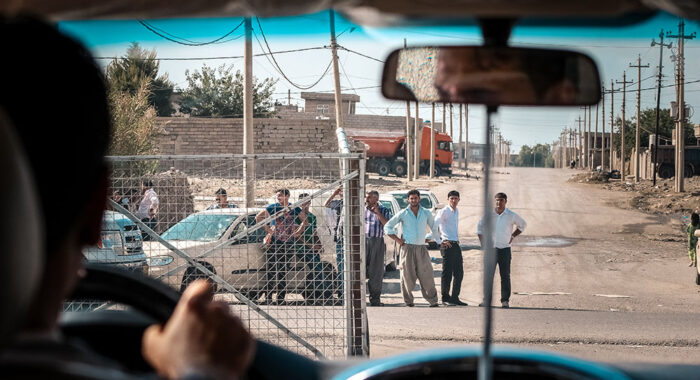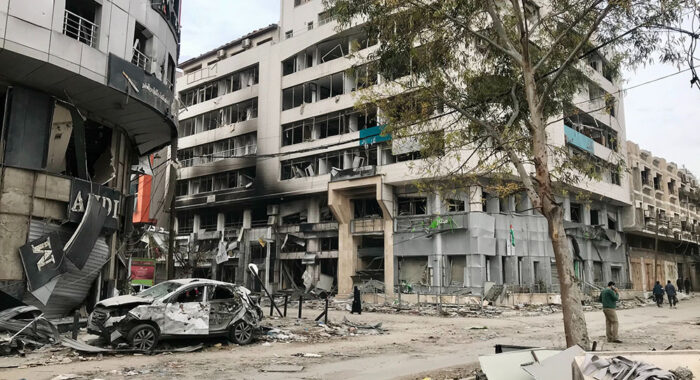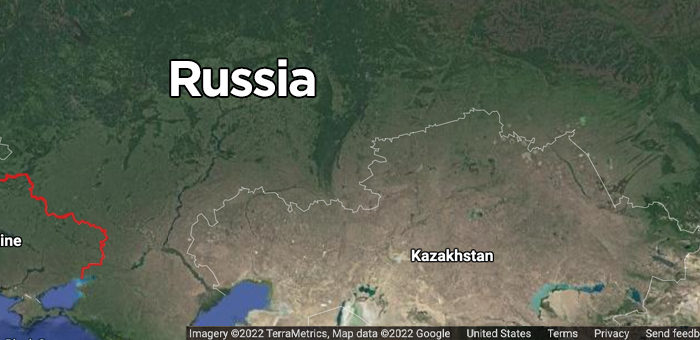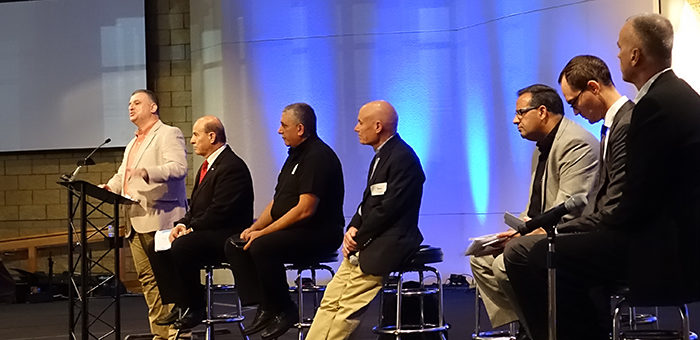Foreword
The National Association of Evangelicals has developed these Guidelines in an effort to improve the skills of Evangelical leadership in supporting religious liberty, promoting the security of free societies and encouraging progress toward the non-violent resolution of international conflict.
We believe that Christians have a biblical responsibility to be peacemakers. But we also believe that Christians are obligated to support the social structures of freedom, especially religious liberty. These Guidelines provide the outlines for thoughtful obedience in both of those spheres of obligation.
We are indebted to the hard work of many individuals who offered advice, caution and wisdom in the formulation of the PFSS program and the production of these Guidelines. Over 60 clergy and lay leaders, representing NAE member denominations, local churches, national organizations, colleges and seminaries, participated in the forging of this statement. In addition to personal interviews, regional seminars were held on the West Coast and in the Midwest, culminating in a two-day meeting at Westminster Theological Seminary in Philadelphia and a final drafting session in Washington, D.C. Of special note in this year-long process is the work of Kent Hill, Robert Pickus, Kenneth Myers and George Weigel. Brian O’Connell, the program’s coordinator, and other staff of the NAE’s National Office and its Office of Public Affairs supervised this work and made significant personal contributions.
These Guidelines are a first step in what we hope will be a long and productive journey, a first step that has seemed like a major pilgrimage, marked by extended discussion, debate and research. Now, for this program to be productive, we need the combined commitment of NAE member denominations, local and state associations, churches and individual Evangelicals. We have been encouraged by the support the program has already received, support from many corners of the Evangelical community.
We welcome more involvement, not just in this program, but in the wider activities that are the focus of our work here. Evangelicals must be active participants in the programs and debates that explore roads to peace, to the protection of democracy and international human rights and to national security. We believe that these Guidelines will foster involvement in a way that is consistent with the theological traditions that we share and treasure.
Billy A. Melvin
Executive Director, NAE
Robert P. Dugan, Jr.
Director, NAE Office of Public Affairs
To the Reader:
The National Association of Evangelicals is now committed to a more serious and sustained entry into the organizational, educational and public opinion arenas which shape America’s role in world affairs. Our Peace, Freedom and Security Studies program will guide that entry. These Guidelines summarize the program’s rationale and explore some of the obstacles that until now have stood in the way of such an engagement.
They outline an approach to work for peace that differs significantly from patterns currently dominating the work of some other influential American religious organizations. These Guidelines offer a different focus, analysis and prescription for work in pursuit of peace.
It is an approach that requires leadership from within the Evangelical community capable of a disciplined and continuing commitment. Our first task is to find and develop such leadership.
Wise leadership, sensitive to the range of perspectives that exist in the Evangelical community, can contribute significantly to the currently divided and confused dialogue. The problem is not simply the inadequacy of the polar voices of left and right. The polarization of the argument itself constitutes a major part of the problem. It is difficult to meld truths present at the “Peace and Disarmament” end of the political spectrum with those heard at the “Security and Liberty” end. But that is our goal.
These Guidelines show how the NAE program can serve that end. They reject those programs that would make religious organizations simply an arm of one or another secular political current. They chart the task of establishing an arena in which competing perspectives can be searchingly explored and improved upon. The Guidelines are less concerned with mobilizing votes on an issue than with examining the sources of our disagreement and unearthing new understandings which can move us toward common ground. They recognize the difference between a church and a political organization, and they expect the dialogue that takes place in a church to reflect that difference.
Evangelicals are well situated to encourage the needed dialogue. Our understanding of the human condition armors us against naive utopianism. We are confident in, and know our responsibility to, our country; but we know also our responsibility to an authority higher than any state.
These Guidelines, however, are more than a call to dialogue. They suggest a direction for our work and the standards by which we will measure our progress. They outline the basic agreements – theological, political and institutional – that had to be reached before the Peace, Freedom and Security Studies program could be launched. The document is the product of over a year of work involving widespread and intensive discussion within the Evangelical community.
These Guidelines mark an important milepost in the growing involvement of Evangelicals in American public life. Some religious and some secular voices have decried this development. Some who have successfully established their values and political judgments in key centers of leadership in the American religious community, and in other educational and intellectual centers do not want their values and judgments challenged. These Guidelines constitute such a challenge.
We challenge those religious leaders who claim to speak for peace or the liberation of the oppressed but who, in our view, serve other destructive ends. We also challenge the claim that all that should be done is being done to reduce the risk of war and to defend belief in the God-given dignity of the individual human being.
One reason for the National Association of Evangelicals’ decision to launch the Peace, Freedom and Security Studies program was a profound sense of dismay as we surveyed the role American religious leaders often played in the foreign policy arena. One would not expect them to enter the discussion in ways that undercut freedom of religion. But consider the testimony of Armando Valladares, a Cuban Christian and poet recently released after 22 years of imprisonment in Cuba. Reflecting on the way American religious leaders’ statements supporting Fidel Castro’s dictatorship were used by Cuban Communists to demoralize their prisoners, Valladares lamented: Incomprehensibly to us, while we waited for the embrace of solidarity from our brothers in Christ, those who were embraced were our tormentors.
Consider the fact that the same tragic pattern is now being repeated, not simply by individual religious leaders, but by major American religious organizations in their response to the plight of persecuted believers in Nicaragua and the Soviet Union.
Different voices are clearly needed in the American religious community. The Peace, Freedom and Security Studies program will strengthen the Evangelical voice. We will not serve as apologists for those who would crush religious belief. We will stand for religious liberty because religious liberty is essential if we are to move away from a world dominated by war.
But our purpose in expanding our work on problems of peace and freedom is not to establish a political position in opposition to the political pronouncements of, for example, the National Council of churches. Nor is it to support the security agenda of the religious New Right.
We begin instead with a problem: The inadequate response of American religious organizations, including our own, to the grant problems of moral purpose and judgment that confront us in the defense and foreign policy arenas.
We stand humbled as we confront the destructive role religion sometimes plays in some of the world’s bloody conflicts. We believe religious leadership has a more constructive vocation.
We understand the error of not engaging in thoughtful consideration of the choices our country faces. While innocents arc assaulted, while old patterns of violence and old tyrannies are confirn1ed in their power, and while new and terrible weapons threaten our future, the religious community should not remain silent. Patterns of thought in the Evangelical community have sometimes made us comfortable in nonengagement. We arc no longer comfortable. We must now be active.
We also understand the error of current religious fashions in the peace arena. Church offices sometimes issue statements on a host of issues in the name of church leaders who have neither the time nor the training to consider them thoughtfully. Great national church and ecumenical organizations have become the instrument of political activists particularly on the left, though also on the right, whose primary commitment is to an ideological position. We have seen the consequences of their disregard for the primary purposes and well-being of their religious communities.
It is no advance for churches to go from passivity to active error. Surely it is an error when, in the name of overthrowing tyranny, religious leaders become handmaidens to even more complete and profound forms of oppression. It is a scandal that American religious leaders provide a significant support system for one of the most repressive governments in Central America. It is shameful when religious exchange programs which falsify the plight of controlled or persecuted churches in the Soviet Union are celebrated as contributions to progress toward peace. It is a tragedy when the urgent need to aid refugees is distorted, as it has been in some religious branches of the Sanctuary movement, to serve the political ends of those who are the enemies of democracy. Yet such conduct now characterizes some of our most influential religious agencies.
We recognize that one could make another list of inadequacies from the other end of the political spectrum. The problem there is not an optimistic and inaccurate picture of Soviet reality; it is the denial of the possibility of change in Soviet society, and an almost total lack of creative effort or even interest in how constructive change can be encouraged there. On the far right of the political spectrum the problem is not Third World demagoguery recycled for American audiences; it is an inadequate sense of responsibility to help deeply deprived Third World societies demanding change. In this perspective, human rights violations in the Soviet Union are highlighted while those occurring in nations allied to the United States are muted or excused. The looming horror of nuclear war is not, as on the left, exploited to develop support for political prescriptions that will do little to prevent it; but, at this end of the spectrum, it is often treated as if only one response were possible: enlarged American military capabilities.
Few in the Evangelical community are now ready to deal with these complexities. Many of us know the biblical basis for our work, but few of us have had experience in analyzing current problems, putting biblical insight into historical perspective, and then assessing the probable consequences of different policy proposals. Without perspective and without preparation, an awakened, religiously- based concern will only prepare the ground for political demagoguery.
Not all who shared in the discussion leading to these Guidelines agreed with every idea and programmatic approach spelled out here. Some wanted no program at all. Others wanted a program based on very different values and goals. An attempt to summarize these “other voices” appears in Appendix A, along with an indication of what in their approach was accepted and what did not fit within the agreement that was achieved.
The Guidelines are a living document. Continuing revision and reassessment will be required as we grow in depth and sophistication. Additional guiding statements will be appended to the basic document as work develops on Church education programs, problems of citizen responsibility, conscience and war, and other specific program areas outlined in Section VII.
A Guidelines statement adequate for the serious, continuing, in-depth program envisioned is necessarily lengthy. Work for peace, particularly in the complex world of Evangelicalism, is a difficult and complicated task. Undertaking such work in a responsible way requires careful thought and planning. Few American religious leaders work on both alternatives to war and the defense of democratic values. Fewer still have undertaken the requisite study. There are among us some committed to a religious witness against violence. But, for many of us, a prophetic voice marking the evil of war is not enough. The equally important task of wisely relating values underlying that witness to the world must be pursued. That is the purpose of this new NAE program.
We are beginners in the difficult task of charting the road to a world secure against the outrage of war, more open to the development of free societies. But we begin with the knowledge that few of the answers now in the public arena successfully meld a commitment to peace and to freedom, and that none offers a sure road to security. We would share in the creative task ahead.
Much depends on your response.
If the Peace. Freedom and Security Studies program is to help the Evangelical community better define and conduct its work in its churches, schools. and publications. it will do so only as some among us take this responsibility as their own.
Should you?
Those of us responsible for helping guide the affairs of the National Association of Evangelicals await your response.
The NAE Executive Committee, October 1986
Dr. Ray H. Hughes, President
Dr. John H. White, 1st Vice President
Dr. B. Edgar Johnson, 2nd Vice President
Dr. Louis L. King, Secretary
Mr. Paul Steiner, Treasurer
Dr. Leith Anderson
Dr. G. Raymond Carlson
Dr. J. Richard Chase
Miss Dorothy Dahlman
Mr. Donald Duff
Rev. Aaron Hamlin
Dr. Thomas A. McDill
Dr. Robert W. McIntyre
Dr. David McKenna
Rev. Daniel Mercaldo
Dr. Juan Carlos Miranda
Dr. Paul E. Toms
Section I: Program History
This section describes the history and the purpose of this program. The NAE decided to launch the PFSS program because NAE leadership believed that Evangelicals could make a distinctive and needed contribution to the debate on security issues in our country and to progress toward a world, safe for free societies, that resolves international conflict without war. The primary purpose of the program is to develop within the Evangelical community informed leadership committed to those goals and capable of guiding our work.
A. History
The National Association of Evangelicals (NAE) is the principal umbrella organization of Evangelical denominations, agencies and churches in the United States. The NAE is an association of over 45,000 churches from 78 denominations, including 45 member denominations. Through its affiliates and subsidiaries, such as World Relief and the National Religious Broadcasters, it serves a constituency of 10 to 15 million. The NAE has committed itself to raise the awareness of Evangelicals on issues of public policy through its Washington, D.C. Office of Public Affairs. The Peace, Freedom and Security Studies program will pursue that goal with sustained attention to matters concerning America’s role in world affairs. It will guide NAE’s entry into organizational, educational and public opinion arenas in which that role is defined.
The PFSS program grew out of two years of discussion between senior NAE officials and the World Without War Council (WWWC). The WWWC is an organization whose singular experience in aiding those who want to relate religious values to progress toward peace and freedom drew NAE’s respect. The Council was able to demonstrate why it was appropriate, how it was feasible, and why it was important for the NAE to take on this added responsibility. Given the increased weight of Evangelicals in American political culture, and the concern in the Evangelical community over the sanctity of human life, a thoughtful Evangelical engagement with the central issues of war and peace was long overdue.
Could this engagement offer an alternative to those religious voices that resist the development and use of only American power? Could it serve the values of a free and pluralistic society as it worked for peace? Could it apply study of Biblical teachings to the complex dilemmas of American choices in world affairs? Could it aid in building agreement in our country on a peace and security strategy worthy of the name? Is it possible to shape such an engagement in ways appropriate to the Evangelical community? As promising answers to these questions emerged, the Executive Committee of the NAE authorized its Washington, D.C. office to begin work.
B. Program Purposes
- To define and help guide the engagement of Evangelical churches and institutions in arenas in which America’s role in world affairs is debated and determined.
- To prepare Evangelical agencies and individuals for wise and continuing activity in those arenas consistent with Evangelical theological understandings.
The NAE undertakes this work fully aware of the realities of adversary power in the international arena and of the legitimacy of American security concerns. The program will confront the harsh facts of totalitarian power. We want to do so, however, in ways that will move us toward a world more capable of resolving international conflict without war: a world more hospitable to a growing sense of mutual responsibility. It is not our intention to add one more voice to a foreign and defense policy debate that is presently incapable of charting ways to act simultaneously for peace, freedom and security. We want our work to contribute to developing that needed capability in our country. We are committed to working for peace and freedom.
Since our primary concern is to develop Evangelical leadership qualified to address these matters, the initial focus of our work will not be within government but rather on the educational institutions, publications and agencies of the Evangelical community.
We recognize that some of the legitimate reasons for inactivity involve our perception of the complexity of these problems. Many within our community fear that proposals advanced in the name of peace will in fact move us closer to war. Others are uncertain about the more basic problem of the appropriate relation of the Church to problems which are political. Anxieties have also been expressed about the possible damage to the Evangelical community that might occur in confronting these potentially divisive issues. We recognize these and other legitimate concerns and have tried to be sensitive to them in developing these Guidelines for our work.
These Guidelines:
a) State the Biblical and theological foundations of our call to be peacemakers;
b) Make clear the political understandings and ethical beliefs that will inform our work and identify the program’s policy goals;
c) Identify some of the obstacles to effective work that now exist in the present peace movement, in our Evangelical community and in the larger society;
d) Define the initial objectives of the PFSS program;
e) Establish the criteria by which we can evaluate the program’s work; and,
f) Explain the program’s administrative arrangements.
Section II: Our Intentions
This section examines the nature of the problem this program addresses. Facing the twin threats of nuclear destruction and totalitarianism, and the difficulty of defining appropriate patterns of work on these problems by religious agencies, many people prefer to ignore international political issues altogether. Others call for involvement in which passion and arrogance combine to chart unwise or inappropriate roles for the Church. Christians, who are committed to freedom and peace-and who know how easily entry into political arenas can corrupt our primary mission-do right to enter such arenas carefully and thoughtfully. The intention of this program is to develop within the Evangelical community leaders whose reflection on the theological, moral and political problems involved in the pursuit of peace and freedom in a fallen world will lead to realistic opportunities for an American contribution to a world safe for free societies, in which international conflict is resolved without war.
Although the NAE recognizes the existence and value of theological and political diversity within its ranks, a commitment to Biblical authority is a fundamental reference point for Evangelicals affiliated with the NAE. Since its formation in 1942, the NAE has affirmed the Bible as “the inspired, the only infallible, authoritative Word of God.” We recognize, however, that diverse hermeneutical theories, theological conclusions and human fallibility create an environment in which agreement in interpretation can not always be achieved.
Among the assumptions guiding the NAE and the PFSS program is a belief in the legitimacy of appropriate Evangelical involvement in political affairs. Though Evangelicals may differ with respect to the precise nature of this engagement, it is clear that Christians are called to be involved in a significant way with the welfare of the general society. The Gospel deals with human beings within the context of the broader community. Evangelicals affirm the sovereignty of God and recognize His providential activity within this fallen world to restrain sin and to promote justice.
The NAE’s PFSS program also begins with an affirmation of the value of democracy, an affirmation rooted in the Christian insistence on the dignity of the human person. At its best, democracy is a remarkable system that has demonstrated the possibility for diverse individuals and groups to coexist and deal with their conflicts without resorting to tyranny or violence.
Finally, the NAE and the PFSS program affirm Evangelical efforts to minimize violence in world politics, even as we recognize the legitimacy of a concern for the common defense.
Against this backdrop, our goal in this program is the promotion of balanced, thoughtful, and productive discussion of the issues related to peace, freedom and national security. We hope to develop a framework for discussion involving all theological and political viewpoints within the Evangelical world. Out of such a dialogue can come, we believe, approaches to the related problems of peace, freedom and security that will advance the public debate rather than reflect its current polarization.
If we are successful, all in the Evangelical community, even those in as profound disagreement as are pacifists and advocates of ‘peace through strength,” will welcome the opportunity to engage in respectful, honest dialogue. We hope, out of that dialogue, to offer alternatives to the present debate, which is too often sterile and rancorous.
“Peace” programs are viewed very skeptically by much of the Evangelical community, as well as by many nonevangelical Americans. This is in part a product of simplistic notions of what constitutes effective work for peace. For example, lobbying against expenditures for military arms is assumed by some to be equivalent to work for peace. Others believe that peace is advanced in direct proportion to the expansion of the defense budget.
We need to get out of these ruts. The name of the program we are establishing has been chosen to reflect one route of escape: the recognition that peace is not an isolated political achievement. We must be concerned simultaneously with peace, international human rights, democratic values and national security.
Specific policy proposals are not the primary focus of this program. Rather an effort has been made to formulate for Evangelical individuals, organizations and churches, guidelines which are capable of encouraging a new kind of debate: one in which the goals of peace, freedom and security are sought together; one which faces honestly the threat of war, the threat of totalitarianism, and the ever present danger of chaos in world affairs; one which affirms the dignity of the human person as our country seeks moral responses to the dilemmas of world affairs; one which helps a divided America pursue its inescapable moral tasks in the world.
Peace, Freedom And Security: The Nature Of The Problem
Many today see the Western democracies as nervously steering a perilous course between the Scylla of slavery and the Charybdis of cultural and possibly total annihilation. Fleeing one monster seems inexorably to draw us towards the jaws of the other. According to this scenario, the contemporary Odysseus casts about for a way to escape totalitarianism without risking a nuclear holocaust.
This particular formulation of the problem may well be false or unnecessarily limited, but it is quite common. Our choice must not be either acquiescence to totalitarian power or life lived under the constant threat of nuclear war. One of the objectives of the PFSS program is to recognize the reality of the threats of both slavery and annihilation, but to encourage the search for achievable alternatives to these stark destinies.
American Evangelicals cannot avoid dealing with these issues. We would be neither victims nor executioners. If our citizenship means anything, surely it entails an obligation to help discover the ideas, commitments and policies that can help lead the world away from a choice between freedom and mass violence.
We seek to make America a leader in progress toward a world where conflicts can be resolved through means worthy of those who have been created in the image of God. A religious engagement with the forces of disintegration that threaten world security should help strengthen those forces of mutuality, of a responsible shared life for all men everywhere, that are affirmed in our Christian tradition. We believe such a religious engagement can respond constructively to the social and political revolutions of our century: to help bring them out of the violence, tyranny and chaos they have so often spawned, toward the fulfillment of their promise of human well being.
Religious reflection on and action in these issues should be undertaken not only without utopianism but with that profound reading of the human condition that is proof against sentimental approaches to problems of world politics, and proof too against fear.
We do not begin in fear. Human intelligence and will, guided by God’s grace, can find ways to secure greater measures both of peace and of freedom, and to preserve and protect the dignity of man.
Section III: Biblical Foundations
This section surveys some of the fundamental theological insights that will guide this program.
The Christian doctrine of sin teaches that man is in a fallen state. Evil has its source in sin, and the ambiguities of many moral choices are the product of a sinful world. The Church has had many different understandings of the appropriate role of the state and the state’s use of force. This program will call attention to the richness and complexity of Christian attempts to understand and to transcend war.
In addition to the doctrine of sin, reflection on the questions of peace and freedom also requires other doctrinal support, including the insistence on the primacy of spiritual ministry in the Church, the meaning of loving service and reconciliation, the tensions of the epoch between the two comings of Christ, and the Biblical vision of the future.
A. The Challenge of Choices
Tyranny and war are old threats. Yet these twin specters of doom have been rendered more sinister because of 20th-century secularism and technology.
In response to these threats, Evangelicals first insist that evil is the result of sin, estrangement from God, which is a constant reality in the human condition. Sin is prevalent in the individual mind and heart, it distorts our relationships, our institutions and decisions, and its effects become entrenched in the structures of society and culture.
Christians assert that redemption, the canceling of sin and the mitigation of its effects, is found only in union with Christ, whose atoning death paid the moral penalty for sin. The Christian confronts sin and its concomitant evils with the spiritual strength of the indwelling Holy Spirit, with the wisdom granted by God and defined by Scripture, and with a compassion that reflects God’s holy love.
But moral choices and their consequences are not simple matters for the Christian. The complexity of moral dilemmas becomes more perplexing when matters of social and political involvement are considered, in part because of the choices simultaneously being made by other moral beings, in part because of the finite knowledge of complex issues, and in part because of the inherent difficulty of applying an array of diverse Biblical principles to a multifaceted problem. In addition, Christians acting out their faith in the context of public life must recognize that not all fellow citizens share that faith or the conclusions to which it leads them. Christians are thus further obligated to give an account for their advocacy of certain programs in light of that pluralistic situation.
Perhaps no problem has perplexed and divided Christians more than the question of justifying or condemning the use of force by the state. There are those who insist that all use of lethal force is morally wrong, even that which is meant only to ward off aggression against oneself or one’s family. Others have believed in the propriety of a “holy war.” To advance or to protect fundamental values, most Evangelicals, along with the majority of all Christians, have rejected both of these responses and believe that, though the use of force should be a last resort, there are some occasions when it is justifiable.
Within the Evangelical community, the Mennonites and the Brethren are among the proponents of the pacifist position, while those in the Reformed tradition have often endorsed a “just war” perspective. Wesleyan/Arminian Evangelicals have usually been closer to the Reformed view, though pacifists may be found here as well. Clearly, given such diversity, any meaningful exchange of views must encourage respectful, but frank dialogue in these matters. Each tradition has its own strengths to bring to the discussion. But none have successfully pointed the way to end war or those monstrous forms of tyranny currently embodied in totalitarian forms of government.
Beyond the question of the use of force per se are the more difficult questions of degree: when, where, and how much force should be employed? Does the destructive capability of nuclear weapons mean that they should be rejected as part of our defense arsenal? Or does their threatened use act as an effective deterrent to nuclear blackmail by an enemy? Would it be better to risk totalitarian subjugation than a nuclear war? Would acquiescence to totalitarian power prevent war, or might it make war more likely?
Within the just war tradition, the question of the justice of the cause always preceded the question of the appropriateness of means. What is being defended, and against what, had to be evaluated before the morality of the instruments of defense was considered. This makes the problem even more complex. In terms of sheer numbers, more people have probably perished internally in totalitarian regimes in the 20th century than in international wars during the same period. Where then lies the greatest prospect-for the loss of human life: Is it in preparing for war to deter an aggressor, or is it in rejecting the use of weapons because of their destructive potential? Does our responsibility require that we ignore numerical calculations and insist on adherence to certain fundamental affirmations whatever the consequences?
These are the kinds of questions which Evangelicals have struggled with when the appropriate response to evil has been debated. It is essential that these difficult issues be confronted in an atmosphere of mutual respect and a common desire to come to conclusions that are pleasing to God.
Our goal in this program, however, is more ambitious than even the difficult goal of respectful dialogue. More is needed than a repetition of sterile arguments, no matter how courteously they are conducted. Can we discover new approaches to the threat of totalitarianism, approaches that bring effective, non-military pressures for change to bear on adversary societies? Are there means for encouraging the Soviet Union to move toward a more open society? Is there hope for new institutional forms and processes that can help to resolve conflicts? Can we devise ways to challenge all centers of power in world politics, calling them to accountability for the advance of peace and freedom? Are there new forms of witness that might aid in this task? Could new and gathered currents of spiritual renewal be brought into more effective relationship to the quest for peace, democracy and security? What new ideas and understandings are needed to break the fruitless log-jam of public debate and, by doing so, help regather America for its inescapable responsibilities in the world? The PFSS program will address these kinds of questions as well.
B. Fundamental Principles
Evangelical responses to peace, freedom and security issues must be based on certain Biblical principles.
- The Primacy of the Spiritual Task
When a Pharisee questioned Jesus concerning the greatest commandment, Jesus responded: “Love the Lord your God with all your heart and with all your soul and with all your mind.” This is the first and greatest commandment. And the second is like it: “Love your neighbor as yourself.” (Matt. 22:37-39, New International Version; also cf. Luke 10:25-27).
The Church must never forget that its primary function is spiritual. Christians individually and corporately are to worship and glorify God. Beyond this, Christians have been commanded to make disciples.
Following his resurrection, the agenda which Jesus set for his disciples was evangelical:Go and make disciples of all nations, baptizing them in the name of the Father and of the Son and of the Holy Spirit, and teaching them to obey everything I have commanded you (Matt. 28:18-20, NIV).
The primary task of the Church in making disciples does not preclude Christian activity in social and political matters. The phrase “teaching them to obey everything I have commanded you” certainly includes Jesus’ command to care for the poor and his admonition to be peacemakers. And the Great Commission is not an exhaustive description of the activity of all Christians.
- Called To Serve The World
In our enthusiasm to honor God and spread the Gospel, Evangelicals must not neglect what Jesus declared to be second in importance only to worship: “Love your neighbor as yourself.” In other words, Christian discipleship is to be intimately involved with the lives of our fellow human beings. Love means hurting with those who suffer and working tirelessly to alleviate that suffering.
In Luke, Jesus uses a parable to give a description of what he means by the concept of neighbor. He does not mean a good friend, or even an acquaintance. The Samaritan who stopped to help the bleeding stranger was the exemplary good neighbor (Luke 10:29-37, NIV).
Paul is unequivocal in describing what is expected of the Christian in matters of rendering assistance to others.
Let us not become weary in doing good, for at the proper time we will reap a harvest if we do not give up. Therefore, as we have opportunity, let us do good to all people, especially to those who belong to the family of believers (Gal. 6:9-10, NIV).
Given this mandate, surely the plight of believers under oppressive regimes should be a concern of all Christians. The response of some American religious leaders to the plight of Christians in the Soviet Union, for example, is a scandal we must address. As we consider the millions who have suffered and died in this century, we must take seriously the stern warning found in Proverbs.
Rescue those being led away to death; hold back those staggering toward slaughter. If you say, “But we knew nothing about this,” does not he who weighs the heart perceive it? Does not he who guards your life know it? Will he not repay each person according to what he has done (Prov. 24:11-12, NIV)?
If Jesus’ words are to be taken seriously, piety must not exclude social responsibility. The Christian life involves horizontal no less than vertical responsibilities.
- The Ministry of Reconciliation Between God and Human Beings
Christians manifest their love for the people of this world by being involved in the ministry of reconciling human beings to their Creator. According to Paul, it was through Christ that God reconciled us to Himself, and we now are responsible to spread the message of that reconciliation to others (2 Cor. 5:18-20, NIV).
The bridging of the gulf which separates human beings from God, thus bringing reconciliation, results in a peace beyond any that this world can give. As the time for his own crucifixion drew near, Jesus comforted his disciples: Peace I leave with you; my peace I give you. I do not give to you as theworld gives. Do not let your hearts be troubled and do not be afraid (John14:27, NIV).
- The Ministry of Reconciliation Among Human Beings
In the Sermon on the Mount, Jesus made very clear his feelings about those who work for peace. “Blessed are the peacemakers, for they will be called the sons of God” (Matt. 5:9, NIV).
Here is the Christian call to a ministry of reconciliation between human beings. That ministry can take many forms. In the PFSS program, we wish to acknowledge the important ways in which law and political community contribute to reconciliation among men. Law and democratic governance are institutional means to resolve conflict without the parties resorting to personal or mass violence. In this important sense, law and political community are instruments of reconciliation. Law and political community may promote, in a fallen world, the best available means to meet the challenge of peace, freedom and security. This is not a utopian dream; it is a matter of wise and steady work building a foundation for political community across national borders.
Such an approach to reconciliation takes full account of Jesus’s injunctions on how Christians ought to deal with evil: You have heard that it was said, “An eye for an eye, and a tooth for a tooth.” But I tell you, do not resist an evil person. … You have heard that it was said, “Love your neighbor and hate your enemy.” But I tell you: love your enemies and pray for those who persecute you, that you may be sons of your Father in heaven. … Be perfect, therefore, as your heavenly Father is perfect (Matt. 5:38-39, 43-44, 48, NIV).
This text is the pacifists’ cornerstone, and the force of it is sometimes carelessly ignored by proponents of the just war doctrine. Many Christians, however, have carefully concluded that it does not apply univocally to the civil sphere. Others question whether it should even function in all personal situations. Some have deferred the Sermon on the Mount to a dispensational future.
But one thing is certain: Christians are expected to be involved in the task of peacemaking. Law and political community are instruments of this worldly reconciliation which pacifists and non-pacifists can both work to strengthen (where they exist) or create (where they do not).
- Biblical Realism
Christians believe that the gracious end of human history has been assured in the resurrection of Jesus Christ: God’s Kingdom will triumph, in God’s time beyond time. We live now between the resurrection and the eschatological Kingdom. Sin and death have been conquered in Christ; but sin remains a dominant fact of life on earth in this “time between.” Conflict-between persons, nations, states, ideologies-is a constant of the human condition this side of the Kingdom come in its fullness. The persistence of conflict is the political meaning of the doctrine of original sin.
The Christian call to worldly responsibility must take full account of the abiding reality of sin, and its effects on individuals and communities. “Biblical realism” urges us to be skeptical-on theological grounds-of all schemes of social perfectibility short of the final Kingdom. Such schemes often reflect a human pretentiousness which is a contemporary expression of the sin of Adam and Eve. The God of Jesus Christ calls us from pretentiously plotting our own perfection to an acknowledgment of our weakness and our inclination to “that which I would not do.”
Biblical realism is not worldly cynicism. Biblical realism teaches us that there is a great gap between things as they are and things as they ought to be. It also teaches us that work to close that gap is of the essence of our Christian vocation.
- Biblical Visions of the Future
The prophet Isaiah was full of hope when he wrote:
They will beat their swords into plowshares
and their spears into pruning hooks.
Nations will not take up sword against nation,
nor will they train for war anymore
(Isa. 2:4, NIV).
The wolf will live with the lamb,
the leopard will lie down with the goat. . .
for the earth will be full of the knowledge of the Lord
as the waters cover the sea
(Isa. II: 6,9, NIV).
Almost a millennium later, the following vision of a “new Jerusalem” was recorded by the Apostle John in Revelation.
Then I saw a new heaven and a new earth, for the first heaven and the first earth had passed away. … There will be no more death or mourning or crying or pain, for the old order of things has passed away (Rev. 21:1,4, NIV).
Few topics within the Evangelical world are more controversial than how to interpret properly these Biblical passages. Some insist that these texts are Messianic and cannot be fulfilled within a fallen, secular society. Others, who emphasize the social Gospel, are more comfortable talking about the Gospel transforming unregenerate society, if not perfecting it as a cultural force.
It is clear, however, that these prophetic utterances stood in stark contrast to the realities in which their authors lived. And today, the fulfillment of the promises seem to many as distant as ever. The challenge is continually to move towards the ideal of the divine promise, while at the same time recognizing that there can only be partial success so long as fallen human beings are given by God the latitude they presently possess.
Whatever our divergent interpretations of the apocalyptic literature of the Bible, Evangelicals are agreed that the coming of the Kingdom in its full glory is a matter of God’s action, not man’s. The fullness of Shalom in the Kingdom is a horizon against which the present can be judged, and towards which future action can be oriented. We shall not reach the Kingdom through the works of our hands. But the works of our hands-such as law and political community-can create conditions more conducive to the pursuit of a more just world than the confusion of international politics today. We cannot create the Kingdom of God; we can nurture a human future more congruent with that Kingdom’s values.
Section IV: Current Obstacles
This section examines some of the ideas which have blocked the road to a wise and effective Evangelical involvement in work on foreign policy and war/peace questions.
It is no easy matter to confront the issues of how nations might avoid war; why liberty is a good thing and how it can be protected; and what a Christian’s responsibility is in a world of conflict and oppression. Many succumb to easy answers: to a temptation, for example, to reduce Christianity to a merely spiritual religion; to the assumption that the refusal to use power is in itself a virtue rather than a denial of responsibility. Too few have been willing to give these problems the sustained attention they require.
Many of the errors involved could be avoided if Christians more carefully examined the presuppositions behind certain conclusions, being especially wary of the distorting effects of fear and vengeance, and mindful of the Scriptural teaching about wisdom.
A number of problems must be addressed before Evangelicals can make significant progress in helping advance the public dialogue on issues of peace, democracy, international human rights and national security. Here are some common misunderstandings that must be confronted.
A. Common Misunderstandings
- “Religion Is Limited to Personal Spirituality”
Though Evangelicals have understandably focused on the primacy of the spiritual life in their Church activities, there has sometimes been a regrettable lack of attention to the Biblical mandate to be involved in the fate of society as a whole.
Narrowly introspective religious practice represents a departure from at least some of the Evangelical past. For example, during the 18th and 19th centuries, Evangelical revivals spawned major involvement in social reform, such as the abolition of slavery. This activist part of our heritage is already being studied and revived in certain parts of the Evangelical world, but the process needs to be expanded further, but only if the dangers and distortions that come with entering social and political arenas are understood and guarded against.
In correcting the tendency to privatization, we must remember that not everyone must be involved with the same intensity, or with the same issues. We must also recognize that involvement is not itself a virtue. The key question is not whether Evangelicals are to be involved, but how: to what ends, through what appropriate means, measured by what standards.
- “Politics Requires Unacceptable Moral Compromise
“Too many Evangelicals consider politics to be a “dirty business” in which high moral ideals cannot survive. Relating moral purpose to the responsibilities of power involves a thicket of problematic choices. We do well to be aware of the difficulties, but we cannot avoid them.
Indeed, we do live in a fallen world. But the need to drive the ploughshare of moral responsibility into the hard soil of political reality remains. That means being aware of consequences and avoiding moral arrogance. It requires that we be skeptical of single-villain theories. It also requires that we be as aware of those dangerous combinations of passion and ignorance that are too often the engines of protest as we are of the costs of apathetic non-involvement.
We have much to learn, but learn we must.
Far from avoiding involvement in such issues as peace, freedom and national security, Evangelicals have a responsibility to seek positions which most advance high ideals rooted in Biblical standards. The failure to accept what many regard as imperfect options may well insure the victory of options which are much worse. Ironically, the unyielding idealist can be a stumbling block to meaningful progress, but a witness to the highest values can also serve a more humane politics.
- “Why Bother? The End Is Near”
Some Evangelicals are so convinced that we are living in the end times that they believe it is pointless to be personally involved in the problems of tyranny and war. This position has one trait very much in common with secular fatalism-the tendency to withdraw from direct involvement with present crises.
This is not the place for a debate on whether or not we are living in the end times. The Evangelical world contains a great deal of healthy diversity at this point. The point here, however, is that even if we are living in the end times, Evangelicals must still be involved in the difficult task of alleviating suffering and seeking to avoid war.
In Jesus’ parable of “The Ten Minas,” the nobleman instructed his 10 servants 10 put the money he had given them to work “until I come back.” (Luke 19:13, NIV). For many Evangelicals, this means that so long as we live and the Lord does not intervene, we are obligated to minister to the world, not withdraw from it.
- “Here Is The Answer”
Equally as dangerous as the refusal to engage in political debate is ill-informed engagement. If there is anything as dangerous as not thinking about war and peace, it is not thinking about them enough.
Unfortunately, religious involvement with war/peace issues has sometimes tended to be long on enthusiasm and short on thoughtful analysis. Both political right and left in church circles tend to focus only on facts and events which support their own particular policy preferences.
Church groups which consider that America can do no wrong often make no effort to supply their members with intelligent critical commentary on U.S. foreign policy. On the other hand, the materials available in other church bodies on foreign policy are indicative of the same problem. The assumption that U.S. foreign policy is usually wrong has been so strong in many activist church groups in recent years, that literature available to participants rarely includes the official positions and rationale of the Administration. The tendency of some to not believe anything American officials state, while accepting at face value the allegations made by almost any foreign or domestic critic of U.S. foreign policy, is irresponsible.
To make matters worse, when these one-sided church stances are dressed up in scriptural, theological and moral warrants (all too often presented as if these are the only legitimate “Christian” positions), the stage is set for division within the Church.
Furthermore, pronouncements made under such conditions are frequently of little help. They often fail to recognize the complexity of very difficult issues. Proverbs 18:17 (NIV) makes us recognize that matters are not always as simple as they first appear. “The first to present his case seems right, till another comes forward and questions him.” Persisting in open dialogue, gaining in knowledge and charting roads to agreement are among the goals in the PFSS program.
The search for the simplistic solution is also evident in the use of Scripture. Evangelicals who share a deep reverence for the Bible must recognize the temptation common to us all to seek justification for positions arrived at by other means. Citing Scriptures to support one viewpoint can be very misleading if there is not a frank and honest discussion of the hermeneutical presuppositions we bring to our exposition of the Bible, the context of the quotation cited, as well as ~n acknowledgment of other passages which may present a different perspective. Drawing inferences from Scripture is a delicate and fallible exercise. Every effort must be made to understand the legitimate Biblical and rational grounds for opposing viewpoints. An appreciation of different denominational traditions is critical in coming to grips with divergent understandings of crucial Biblical passages.
The Evangelical commitment to the authority of the Scripture necessitates a willingness to take the entire Bible seriously. Matters are often not as clear cut as we would like them to be; truth often resists confinement within moral platitudes and mathematical formulas. Consideration of Scripture for Evangelicals must involve the illumination of the Holy Spirit, an awareness of Church traditions, faith and the careful use of reason.
Finally, Evangelicals must avoid the illusion of thinking that something has been accomplished for peace, just because the stated goals of an activity have been in the name of peace. Jeremiah was furious with the people of Jerusalem for lying to themselves and each other about their condition. Speaking for God, he warns of judgment precipitated by duplicity:“
They dress the wound of my people as though it were not serious.
‘Peace, peace,’ they say, when there is no peace (Jer. 6:14, NIV)
May it never be said of us that we cried’ ‘peace, peace,” when in fact we had only in the name of “peace” set the stage for war and suffering.
- “That Was Then. This Is Now”
Evangelicals are not immune to a problem which is widespread in American culture: ignorance of and lack of appreciation for the past. We frequently are unaware of our religious and political roots. This is a tragedy, because there is much that could be learned by serious study of history, especially of the history of theology. Ours is not the first generation within the Church which has struggled with what is appropriate Christian conduct relative to the use of force. Prominent early Christian thinkers were frequently very sophisticated in their handling of complex and difficult theological and political questions. We could benefit from a study of their thought.
The PFSS program is committed to a recovery of the legacy of the Church’s wrestling with these matters, and to encouraging the wisdom that comes from understanding the experiences of other people and nations in other times.
- “Truth Is Always Halfway Between Two Extremes”
In avoiding the adoption of unexamined, unbalanced extreme positions, we may fall victim to an equally treacherous pitfall-the view that everybody is half right, and therefore, that the truth in every issue lies in the middle. Societies which champion pluralism and tolerance are prone to become increasingly embarrassed with the very concept of the sovereignty of truth. Evangelicals must not fall prey to this insidious temptation.
Contemporary examples of the power of this myth in foreign policy debate are quite common. For example, many assert that the United States and the Soviet Union are both superpowers, committed to their own ideologies, engaged in immoral actions in pursuit of their respective national interests, and involved in political propaganda which is more false than true. The conclusion is then often drawn that both powers are morally equivalent, and the solution lies in debunking about half of what each side asserts, while accepting the other half.
The myth that truth lies halfway between two polarized positions leads swiftly to the conclusion that the evil fostered by the democratic West is equivalent to that found in the Communist world. Yet this “answer” is flatly contradicted by history and current events. An obsession for condemning all powers equally does not work in the interest of truth.
Only open and thoughtful discussion will get all available information before us so we can come to terms with the complexities of issues such as Central America or the defense budget. Only on this basis can appropriate decisions be arrived at. Truth will sometimes be found on the “right,” sometimes on the “left,” and sometimes in the “middle.” Truth may indeed be found, at times, ahead of the current argument. Truth is not finally subject to majority vote. The Church must not lose faith in the sovereignty of truth as rooted objectively in God, not subjectively in man.
B. Avoiding the Pitfalls
Just as some predictable pitfalls prevent us from coming to grips with problems of peace and freedom, there are a number of perspectives that can assist and clarify our thinking. Some of them have been mentioned above. Here are a few others:
- Remember the Importance of Context
We must learn to explore issues in depth. This involves a careful analysis of the differing systems of moral reasoning and of the assumptions which underlie various policy positions and proposals. We must become adept at recognizing positions and attitudes that reflect simple ignorance, that express rigid ideological allegiances, and that are based on unexamined or mistaken presuppositions.
Context analysis could make it clearer, e.g., why all the facts about the evils of totalitarianism seem to have no effect on some who, surveying the possible effects of nuclear weapons, propose unilateral nuclear disarmament. It may well be that fear of extinction has become so consuming that no other reality can break into the discussion. In such a situation, it may be necessary to point out the theological problem involved in sacrificing everything for survival. But it may also be advantageous to make the case that survival may be even less likely if unwise proposals are adopted.
We need to be able to identify proposals which reflect little or no perspective of human experience beyond their own. Many people fortunate enough to be born in the West and who have had no first-hand contact with political repression or the documentation which describes it display a distressing lack of perspective when comparing life under different existing political systems. The same is true of those who are uninformed about the awful consequences of military conflicts, especially in a nuclear age.
In short, we must be much more attentive to the assumptions beneath various alternatives in theory and practice. And of course we must be willing to examine the biases and motivations of our own positions as well.
- Avoid Approaches Based on Fear and Vengeance
The basic motivation for Christian action should not be fear, but rather a steadfast commitment to divine love and justice. The notion that the ultimate evil is death, whether it be through a nuclear war or totalitarian repression, is not a Christian position. Of course, life is a creation of God and to be treasured as such. But material existence has never been for the Christian the ultimate good. Nor can escape from suffering under totalitarianism be considered an ultimate good. The will of God is our ultimate goal, and we must not be presumptuous in assuming that His will is always to our advantage.
In our struggle against tyranny and war, if our motivations are truly Christian, they will be based on something more than simple fear of extinction and desire to avoid suffering. Nor should our actions spring from hatred and the desire for revenge. A constant within our tradition is the divine command not to seek vengeance. “Do not hate your brother in your heart. … Do not seek revenge or bear a grudge against one of your people, but love your neighbor as yourself. I am the Lord” (Lev. 19:17-18, NIV). In Deuteronomy 32:35, God claims the right to avenge. Paul insists on the same point in Romans 12:19. It should be noted that it is within this context that Paul justifies the legitimate use of the sword by the State, as an agent of God’s wrath.
To the extent some Evangelicals endorse the possession of nuclear weapons, the rationale for deterrence should not be hatred. If deterrence is to be considered a Christian moral option, it must be linked to more positive affirmations, e.g., that the desire to preserve freedom and peace is consistent with divine notions of love and justice. The issue of whether the means are appropriate to the goal will have to be addressed as well.
- Insist on Biblical Realism
The Evangelical commitment to God, and His truth, must be absolute. Truth is no respecter of political or theological spectrums. Truth remains the truth regardless of what cost its proclamation may involve.
As Evangelicals we are committed to following the will of God to the best of our ability and our understanding. We affirm the desire to advance divine love and justice. They are absolutes for us. Yet, the means by which we advance divine love and justice are not always completely agreed upon by Evangelicals. Evangelicals committed to a pacifist position believe that certain means are wrong irrespective of the consequences of refusing to use force. The Christian community must respect this perspective when it is part of a religious witness beyond the political arena. It has a long and venerable history within the Christian tradition. When, however, it enters that arena it must be judged by the same attempt to assess the consequences of action as apply to any other proposed policy.
Most Evangelicals believe that advancing the cause of love and justice does involve, on occasion, the use of force by authorized agencies. Within this understanding, consideration of the consequences of proposed policies is right and appropriate. It is not fair to identify such considerations with simple utilitarianism, any more than it is just to dismiss pacifism as irrelevant utopianism.
What is often missing in our discussions is an informed and realistic assessment of the likely consequences of the programs for “peace” or “defense” that are commonly advanced. Evangelicals should heed the warning of Jesus to his disciples: “I am sending you out as sheep among wolves. Therefore be as shrewd as snakes and as innocent as doves” (Matt. 10:16, NIV). Christians involved in discussion of peace, freedom and security issues must strive to maintain that delicate balance between innocence and shrewdness.
Section V: Political Understandings
This section enumerates a number of general political premises that will guide our program.
While the Bible does not teach democratic theory, democratic theory rests on Biblical insights about the inalienable dignity of the human person. As a result, Christians should not be afraid of affirming their support for such institutions and should seek to extend the benefits of such institutions to others, especially those living under totalitarian tyranny. American Christians should also be unafraid to take advantage of the resources of their own nation in pursuing that goal, while avoiding over weaning nationalism and jingoism. Above all, Christians must take the threat of modern war seriously but not hysterically, and must seek alternative methods of settling international disputes.
The Peace, Freedom and Security Studies program will not undertake partisan electoral activities. But “politics” also refers to attempts to define the good society, to conceive the public good, to establish standards of conduct and responsibility for social interaction, and to chart accurately the realities of power and purpose which all who wish to advance this program’s goals must confront. Such a political engagement is appropriate for religious agencies. Any Church undertaking work on peace, freedom and questions of national security should state the political as well as the theological beliefs that guide its work. Political action on these matters by religious agencies inevitably communicates certain attitudes toward our system of political authority and toward work for change within it.
Therefore, we state here the political understandings which will under gird the work of the Peace, Freedom and Security Studies program:
- We are committed to the national community of which we are a part, but we set considerations of the national interest in the context of additional commitments to the glory of God, to the good of all peoples, and to the search for the resolution of international conflict without mass violence.
- We affirm the virtues of democratic political systems because of their root values: the sanctity and dignity of the individual person. We have high regard for the democratic process by which the right of the majority to rule and the rights of political minorities, including the right to work to advance their views, are protected. We will demonstrate respect for individual conscience and for institutions of law and will encourage the processes in a democratic society by which each can improve and reform the other. Our work will seek to improve and extend the democratic process so it is strengthened as a reality and not simply maintained as an ideal.
- We believe that the public climate should not be dominated by coalitions of passion and ignorance that endanger the nonviolent character of democratic processes. By encouraging discussions of problems of peace and freedom in ways that call forth man’s capacity for reason and mutual respect, we wish to model ways in which agreement may grow out of conflict.
- We recognize that, although responsible activity depends upon informed political judgments, very few of us will ever qualify as experts. Our role remains a crucial one: setting the goals we wish to see achieved and stating the values we wish to serve, thus influencing the direction and character of governmental decision-making.
- We recognize that the initiative for policies aimed at the non-violent resolution of international conflict is unlikely to come from government alone. Government can implement goals, but religious agencies and other non-governmental elements in American society can provide the religious and moral impetus for progress toward peace, freedom and security.
- We are aware of the current commitment of all states to the use of war as the ultimate instrument for resolving international conflict, and recognize the fundamental threat to peace posed by such commitments. We reject political perspectives which define work for peace as involving only opposition to American use of military power. We mean to face as realities both our own nation’s use of violence and the organization and use of violence by other states and political forces, and to propose or support alternatives to violence in world politics.
- We believe that our work must include an accurate assessment of hostile Communist states, and other contemporary anti-democratic governments and ideologies, recognizing their variety, their political, economic, and ethical appeals, and .the serious threats they pose to the values of this program and this country.
- We want to encourage American initiatives to alter the current Soviet agenda and to develop pressures-both coercive (yet non-violent) and persuasive-on and within that system capable of moving that country toward more open society and toward a partnership with us in progress toward the non-violent resolution of international conflict and the well-being of our peoples.
- We believe in the necessity and desirability of American engagement in problems of world politics. American withdrawal from international problems would deny that responsibility. We will emphasize ways to fulfill our responsibility by means other than the threat of war.
- We believe that peace and freedom have an organic relationship, realizing that democratic, societies are the least likely to engage in wars of aggression.
- We believe that peace and justice are also related, but, understanding that there are competing views of justice, we will give priority to the discovery of processes by which competing views of justice may conduct and resolve their conflict without violence.
- We realize the terrible threat that modern weapons pose to human civilization, but reject the idea that survival is the primary value, or that engendering a climate of fear, or an acquiescence to the most brutal forces in world politics are ways to assure survival.
- We recognize that choices regarding participation in war by an individual or a nation are often morally ambiguous. Most see war as an evil and a threat to human continuity. For some, a moral witness against war is their first responsibility. Such a witness can serve humane ends. It can also be distorted to serve other, destructive ends. There are dangers, too, in the action of those who see the obligation to provide for the common defense as a fundamental one in any human community and recognize that one side’s refusal to engage in war is no guarantee that others will also refuse. We accept, therefore, that good men may differ on the morality of war. Our appeal is that all, whatever their views on the use of national military power in a particular instance, join in action to develop alternatives to reliance on war for justice or security.
Section VI: Policy Goals
This section describes the long-range policy goals that the program will pursue:
- Peace
- Freedom
- Security
- Political Community
- A Change in the Soviet Agenda
- Reversing the Competition in Arms
- Change and Economic Development
- Change Without Violence
- Government Which Respects the God-Given Dignity of Every Person
In seeking to advance the policy goals listed below, we hope to improve the quality of activity in the arenas of public opinion and public policy in which America’s role in world affairs is determined. We begin with our own activity, seeking to demonstrate models of study and public dialogue in which emotional blackmail and rancor are replaced by a search for truth; in which passion and ignorance are supplanted by an observable respect for reason.
We believe that the proper role for religious institutions in society is that of teacher, not as competitor for political power or as military strategist. We wish to assist in laying the groundwork for agreement in society on our country’s right role in world affairs. We encourage Evangelicals to take seriously and responsibly the articulation of their own perspectives on specific policies.
Wise policy can only emerge from a serious process of study and reflection. In that study the program will seek to advance the following goals:
A. Peace
A primary goal of this program is to encourage American leadership in progress toward a world that resolves international conflict without war. The peace we are seeking to encourage in this program is a limited peace: it is not the inner peace of a relationship with God, nor the absence of all conflict because of the fulfillment of God’s Kingdom, but the peace which is possible between organized political communities, achieved as law and political processes provide alternatives to the violent resolution of conflict.
B. Freedom
We will demonstrate a commitment to the values and institutions of a free society and we will support those in other societies who wish to build those values and processes into their own future. We will uphold the idea that peace and the advancement of human rights, especially religious liberty, are inextricably linked.
C. Security
Our general commitment to the well being of all human beings does not entail the abandonment of our sense of responsibility to our own political community. In a violent world, we share a commitment to the common defense. We want an America strong enough to resist attack and to influence the course of world affairs; yet an America that is continually seeking realistic alternatives to war as a means of resolving international conflict.
D. Political Community
International and transnational legal and political institutions could provide alternative procedures for resolving conflict. They can function, however, only as a common sense of identity and shared values makes possible growth toward international political community. The inadequacies of today’s international institutions are apparent; consider, for example, the gap between the Charter of the United Nations and its present role in world affairs. We want to aid in the long work of building world institutions which do not traduce their own charters. We want to strengthen that sense of community which, across all the barriers that divide us, could move all peoples toward participation in a world community safe for free societies.
E. A Change in the Soviet Agenda
We are committed to more creative initiatives from our own country. But we see little hope for constructive change in international affairs without a radical shift in the Soviet agenda. Can American action, by means other than the threat of war, help change Soviet policy? Can our action change the context for negotiations and create pressures and incentives for needed change that do not erode the ground on which future agreement could be based? Exploring these and other related questions will be one aspect of our work. We want our work to help change rather than confirm the present Soviet agenda.
F. Reversing the Competition in Arms
In no arena are initiatives more needed than in efforts to reverse the competition in arms. The sorry history of efforts at arms control and disarmament leads to a warranted skepticism, but not to an abandonment of continued effort. There are new realities in Soviet society and in the world strategic arena. The shift to defensive weapons, for example, could lead to a massive expansion of arm expenditures. It could also provide the occasion for new efforts at mutual security arrangements-action to protect people of the U.S. and the Soviet Union from nuclear attack. America could take the lead in bringing such security arrangements into being, not simply for us and for our adversaries, but for a world now dominated by the threat of nuclear war. Such efforts, when allied to the pursuit of the other goals listed here, could lead to conditions in which major cuts in all forms of military expenditures become feasible. With the clear recognition that progress in limiting arms requires change in our adversaries as well as ourselves, we will pursue that goal.
We will enter the arms debate, but not to argue for or against particular weapons programs. War has come with weapons buildups; it has also come as a consequence of not matching power in the hands of adversary nations. This program will focus its energies on realistic alternatives to reliance on national military power for security, alternatives capable of confronting and altering present patterns of power in world politics.
G. Change and Economic Development
Conditions of deprivation and exploitation, and the awareness that such conditions need not be tolerated, have created a climate of revolutionary change in our century. The promise in that demand for change has often been unfulfilled. New and sometimes more brutal masters have replaced old ones. Too often, even the basic material conditions of life have deteriorated rather than advanced. We want our work to help assure that the demand for economic, political, and social change, and America’s response to that demand, actually help produce real progress toward more adequate material standards of life and greater respect for human dignity and political freedom. We want to aid those who work without violence for such goals.
H. Change Without Violence
Since values must be defended and needed change sometimes forced, those who want alternatives to violence must understand and help develop other ways to prosecute and resolve conflict. In addition to the legal and political processes referred to above, the PFSS program will therefore study and seek ways to apply that spectrum of possibilities for change without violence that runs from nonviolent forms of social organization for the defense of values to new concepts of communication and conflict resolution.
I. Government Which Respects the God-Given Dignity of Every Person
We enter this program as committed Christians and as committed Americans. As Christians, we are impelled to this work by our recognition of the God-given dignity of every human person, which is the root of the Biblical injunction “Thou shalt not kill.” That dignity is the source of those basic human rights whose protection is one crucial responsibility of rightly-ordered government. A peace which sacrifices human freedom -particularly religious liberty – is morally bankrupt and not an option for Christians to consider. The PFSS program will work to reconnect the goals of peace and freedom, and will seek, in ways that concurrently promote the prospects of peace and security, to aid those whose basic human rights are now systematically violated. We will refuse to silently acquiesce in human rights violations for the sake of a spurious “peace.” We will also refuse to abandon work for a genuine peace as we defend human rights, human freedom and religious liberty.
Section VII: Program Objectives
This section summarizes the program’s initial specific projects and activities.
Since one of the chief obstacles in working for peace and freedom is careless thinking about what they mean, the PFSS program will be largely educational. Three initial categories of activity will be pursued: the training of leaders; the providing of material resources; and the assistance of Evangelical media coverage. These areas of service will be coordinated through the NAE’s Washington office.
As the program begins its work, there are several specific activities we intend to pursue:
A. Leadership Development
- The development of a strong core of Evangelical leaders capable of providing guidance and direction for its work.
- The incorporation of the efforts of the program into long-standing NAE leadership training events (e.g., Federal Seminar, Washington Insight Briefing, NAE Washington Insight, National Congress on Christian Education, etc.).
- The establishment of summer intern programs to give future leaders (and their advisors) an opportunity to study the full range of Evangelical perspectives on these concerns.
- The development of new training seminars dealing with the problems of appropriate and effective work for peace, freedom and security. Such seminars will be geared for various age groups, and for various levels of experience.
- The support of college and seminary faculties and staffs as they work to improve their understanding and teaching on these matters, and the encouragement of their students to assume the serious responsibilities discussed in these Guidelines.
- The discovering of new ways for churches, denominations, associations and individuals to express publicly their concerns on these matters.
B. Resource Center
- The establishment of a clearing house of information about the various Evangelical theological foundations to thinking about peace, international human rights (including religious freedom) and national security issues.
- The development of study kits, visual aids, and other youth and adult education material, including bibliographies on specific problems and issues, e.g., Christian ethics and war, regional foreign policy conflicts, nuclear weapons, etc. These kits will be designed for individual, informal groups, and Sunday school settings, and would be distributed throughout the NAE network.
- The creation of a speakers bureau that could provide qualified people representing various viewpoints for church Sunday school programs, college seminars, etc.
- The production and distribution of publications that would give Evangelicals exposure to the many available perspectives on questions of foreign policy.
- The development of events and materials which examine the complexities inherentin problems of conscience and war, which can help chart the standards formoral choice that offer the best hope of supporting democratic values andencouraging peace. They will be designed to aid young people and their advisorsin addressing the responsibilities of citizenship and religious conscience.
C. Media
- The support of Evangelical media through the production of articles, reports and programs that probe the moral and political complexities of questions surrounding peace, freedom and security.
- The dissemination of Evangelical thinking in the secular media by promoting qualified Evangelical voices capable of representing that thinking on public affairs programs, and in magazines and newspaper articles. These kits will be designed for individual, informal groups, and Sunday school settings, and would be distributed throughout the NAE network.
Section VIII: Assessment Criteria
This section isolates a number of general and specific tests that will demonstrate whether or not the program is doing what it set out to do.
For the PFSS program to have any significant positive effect, it must constantly refer back to first principles. Those first principles include Biblical teaching about man, sin, society, the task of the Church and God’s will. Other first principles originate in historical and social observations. Still other principles are stated in the goals of this program, including both its theoretical foundation and its training and administrative responsibilities. All of these must be kept in mind by the NAE staff, advisors and participants in the PFSS program.
A. Biblical and Theological Foundations
- Does our work reflect the priority of our commitment to the Lordship of Jesus Christ?
- When people encounter the PFSS program, do they encounter a distinctively Christian enterprise, or merely another partisan political force?
- Do our programs acknowledge the full range of Biblical perspectives on war, peace, security and freedom?
- Do we understand that the Kingdom of God is a matter of God’s time, not our own? Have we defined responsible, morally sound ways to bring considerations of that vision into our work in the hard soil of this world’s realities?
- Have we defined “peace,” “justice,” and the relationship between them in ways that take account of both the eschatological meaning of Shalom and our historical responsibilities and opportunities this side of the coming of the Kingdom in its fullness?
- Does our moral analysis of peace, freedom and security issues take account of the responsibilities of governmental leaders in circumstances where choices must often be made between relative evils? Does our work deliberately try to create situations in which better policy options can be responsibly pursued?
- Have we avoided, in our work, the converse temptations of arrogant self righteousness and cynical despair?
- Have we entered the foreign and security policy arena without sacrificing an understanding of the primacy of our spiritual task which is to worship God and proclaim the gospel?
- Does our work challenge national arrogance, seeking to embody in political affairs a striving for human dignity and the rights of all peoples? Listening to the Gospel, do we understand what it means to love our enemies, while defending our values? Does our work demonstrate the conviction that God is present in history, asking us to be His instruments in a search for peace and in defense of human dignity?
- Does the program demonstrate respect for a religious witness against war when that witness measures itself by transcendent values and acts in accord with those values? When pacifist belief enters the political arena, contesting there for political influence, does the program subject the suggested proposals to critical criteria, evaluating the consequences as well as intentions of policies?
B. Developing Leadership
- Have we developed within our constituencies a core of lay and professional leaders who want to relate religious values to problems of peace, security and freedom? Do they understand how such an effort can be undertaken in ways congruent with Evangelical biblical and theological understandings?
- Have they studied these Guidelines?
- Are they applying them in work, in their denomination and in the public arena?
- Is the program in regular communication with them?
- Is their number growing?
C. Clarifying Ideas
- Does the work of these leaders reflect awareness of the realities of adversary power in world affairs and of the legitimacy of a concern for American security? Does it confront the harsh facts of the expansion of totalitarian power? Does it do so in ways that move us toward a world more capable of resolving international conflict without war? Does it affirm human dignity and foster a growing sense of responsibility for all, including those living under governments which are our adversaries?
- Do our programs reflect, and bring into fruitful dialogue, the full range of social-ethical perspectives on issues of peace, freedom and security now found among American Evangelicals?
- Does the program, in its recognition of evil and its source in the fallen nature of man, yet recognize our human capacities for civic goodness, love and compassion, along with a duty to use our God-given capability to fashion political community so as to make peace and freedom possible?
- Have we clarified confusions surrounding the word “peace,” distinguishing concepts of peace:
1) as an inner state which arises from a proper relation between the individual and his Creator;
2) as the absence of all conflict because men live in harmony in a world governed by love and understanding;
3) as the antonym of war, a peace between organized political communities, achieved because law and political processes make possible the non-violent resolution of conflict?
- Work is needed on all three concepts of peace. Has this program, as distinguished from the full mission of Evangelicals, explained why it focuses its work on the last definition above?
- Does our work demonstrate an understanding of the relation of the attainment of justice to peace? Given competing views of what is just, does it also teach why a primary need of our time is to establish morally sound, non-violent processes by which conflicts over what is just may proceed without war?
- Have program materials and projects provided opportunities to explore the political understandings and the peace, security and freedom goals which this program seeks to advance?
D. Fostering a Sense of Responsibility to Our Own Political Community
- Does the program’s work demonstrate a biblically responsible commitment to the United States of America and to responsible citizenship? Does it build agreement on America’s right role in world affairs? Does it demonstrate a thoughtful understanding of the facts of power in world affairs?
- Do our programs frankly acknowledge the different political judgments to which contrasting social-ethical perspectives lead? Do they seek to chart common political ground to advance the causes of peace, freedom and security?
E. The Right Role for Evangelical Organizations
- Has the program aided participants in sorting out the right relation of NAE member denominations and local churches to their own members in this field?a) To other religious bodies?b) To the public arena?
- Do we better understand the appropriate engagement of religious bodies in the peace, security and freedom public policy process?
- Is there a growing consensus, rather than increasing polarization, on these problems within our Association?
- Is the spiritual integrity and intellectual quality of our discussions, events and materials clearly an improvement on the peace and security debate in other arenas?
- There is a politics of “peace” which sees America as the primary villain in world affairs; which effectively resists only American military programs; which teaches American withdrawal from contests of power (often in the interest of the most brutal forces in world politics) rather than a wise engagement; which urges Americans to believe leaders of adversary societies rather than our own; which tends to confirm the Soviet agenda, rather than to change it. Have we demonstrated a wiser model of how American religious bodies can contribute to progress toward peace? Is it visible in the public arena? Have we engaged those committed to the “peace” politics described above in the kind of dialogue that can lead to greater wisdom?
- Does the approach we take also challenge those who would rely primarily on military power to preserve the peace and who make no effort to find and develop other-than-military means for achieving security and defending values?
F. Work
1. Have we developed models of how to forward the program’s goals:
a) in Evangelical colleges and seminaries
b) in the Evangelical press and media
c) at the denominational level
d) in state associations, local churches and Evangelical agencies
e) in Sunday schools and youth education programs?
- Have we developed a curriculum and materials for educating responsible and continuing leadership for the work of Evangelical agencies in this field?
- Have we developed a resource center which can provide objective information, advice, publications, study kits, speakers, bibliographies, etc. on Evangelical interaction in the peace, freedom and security arena?
- Have we developed materials for young people and their advisors which explore problems of national defense, ethics and war, and aid in thoughtfully considering the responsibilities of citizenship and problems of religious conscience and war?
- Have we established a network for those interested in forwarding program goals? Are we in regular touch with them?
- Have we established a process for drawing up annually an agenda describing the work our program and the NAE Washington, D.C. office will do on the program’s goals?
- Have we provided opportunities for leaders in the Evangelical community, as individuals, to address in thoughtful policy statements the issues on our agenda? Does our work on issues relate specific policy choices to the purposes and values of this program?
- Are we helping Evangelical leaders evaluate and improve their sources of information and opinion on peace, security and freedom issues?
- Are we encouraging Evangelical churches to make this program’s perspective visible in the press and public life of their community?
- Through participation in this program have individual church members broadened their horizon, enhanced their ability to relate the Gospel and their Christian faith to problems of peace, freedom, and security and deepened their understanding and constructive interaction with those people who hold differing views?
- Have we provided opportunities for personal contact with people in adversary societies in ways which advance the goals of this program?
- Are we active in defending religious liberty abroad? Are we aiding pro-democratic forces? Are we advancing human rights concepts in international politics? Are we exploring ways to return international institutions and organizations to the purposes of their charters? Are we advancing policies and ideas that improve the chances for the non-violent resolution of international conflict? Are we arming program participants against sentimental approaches to peace that ignore the realities of power, and also against a simple acquiescence in those present realities that, unless changed, assure a continuation of war? Has our work strengthened an open, rational, non-violent public policy process on peace, freedom and security issues?
G. Administration
- Do we have an Advisory Board worthy of the confidence of Evangelicals in the various regions and denominations that make up the National Association of Evangelicals? Does it represent competing currents of thought moving in our churches?
- Do we have a panel of Consultants qualified by their knowledge, experience and belief to help assure wise program engagements?
- Do we have qualified and responsible staff?
- Have we built an adequate financial base for the continuation of this program?
- Have we adequate reporting and evaluation procedures which will assure the full support of this program by the NAE’s Board?
- Have we established a leadership network which defines clear standards for those who accept leadership responsibilities in this program and which enables communication with NAE related denominations, state and local associations, seminaries, colleges. publications and regional centers?
SECTION IX: Administrative Arrangements
This section explains how the program will be administered and lists the people currently responsible for guiding it. It also describes how the program will disseminate the results of its work through a network of Evangelical denominations, institutions, state associations and regional contacts.
The guiding responsibilities of the NAE’s Peace, Freedom and Security Studies program are as follows:
A. Administrative Responsibilities
The NAE Board of Administration and Executive Committee have ultimate decision power on all activities of the PFSS program.
Dr. Billy A. Melvin, Executive Director of NAE, will provide overall responsibility and direction for the program.
Dr. Robert P. Dugan, Jr., Director of NAE’s Office of Public Affairs, assumes administrative oversight for the program.
Mr. Brian F. O’Connell, PFSS program Coordinator, will staff work on the program done from the NAE’s Washington office.
B. Consultants/Advisors
Mr. Robert Pickus, of the World Without War Council (WWWC), and Mr. George Weigel, of the James Madison Foundation, will serve as senior consultants to the program. The Council’s experience in helping non-governmental and religious agencies define appropriate entry into peace, freedom and security issues will aid the program’s development. The quality of their concern for the moral dimension in American foreign policy as well as their commitment to both peace and freedom gives value to their input. Mr. Pickus and Me. Weigel will provide advice, caution and programmatic help to the PFSS program, but will not direct it.
An Advisory Board, approved by the NAE’s Executive Committee will help direct the program and provide specific guidance to its activities. We plan to complete the formation of the 20-member group by the end’ of 1986. Those already approved by the Executive Committee are:
- Dr. Mark Amstutz, Chair, Political Science Dept., Wheaton College (IL)
- The Honorable William L. Armstrong, U.S. Senator (R-CO)
- Dr. Myron Augsburger, Pastor, Washington Community Fellowship (DC)
- Dr. John A. Bernbaum, V.P., Christian College Coalition (DC)
- Dr. Arthur Climenhaga, Chair, NAE Theology Committee
- Dr. Robert P. Dugan, Jr., Director, NAE Office of Public Affairs (DC)
- Dr. Robert Duncan Culver, Professor of Theology, Winnipeg Theological Seminary (Canada)
- Dr. Dean C. Curry, Chair, Political Science & History, Messiah College (PA)
- Dr. Mark Elliott, Director, Institute for the Study of Christianity and Marxism, Billy Graham Center (IL)
- Dr. Carl F.H. Henry, Lecturer-at-Large, World Vision (VA)
- Dr. Kent R. Hill, Executive Director, Institute on Religion and Democracy (DC)
- Dr. Ray Hughes, President, NAE
- Dr. David McKenna, President, Asbury Theological Seminary (KY)
- Mr. Kenneth A. Myers, Editor and Author, Philadelphia (PA)
- Dr. Fred P. Thompson, Emmanuel School of Religion (TN)
- Regional Contacts/Organizational Network
The PFSS program will develop an organizational network of contact people in each evangelical college, seminary, member denomination, local and state association, evangelical publication and agency. Each member of the program’s network:
- Will have an understanding of the program’s purposes, ideas and materials for explanatory duties and be able to interpret projects and activities.
- Will receive program materials and be asked to give their critical assessment of them.
- Will communicate to their peers those aspects of the program most applicable to their respective environment.
- Will identify people in their arenas that are suitable for further leadership development by the program.
- Will aid in the regional activities that the program sponsors in their area.
In short, this network will become the channel through which the PFSS program reaches Evangelicals across the country.
Appendix: Other Voices
This Appendix looks at opinions that are common in the debates about peace and freedom, and offers some reasons why those opinions have not been accepted by the PFSS program.
These “other voices” are also our voices: They are present in the Evangelical community. They were heard in our Guidelines discussions and they influenced the present document. The Guidelines, however, were not shaped by these voices; we made other choices.
This section summarizes some of the most important of these theological, historical and political judgments and, in briefest compass, explains why these voices were not accepted.
Many of these arguments are based on much deeper considerations than can be fully reproduced in the following brief summaries. They serve only to mark the fact of the disagreement and give some sense of the ideas under discussion, a discussion we hope will continue and lead to wiser and more effective work for peace, freedom and security.
When the PFSS program began its work, many doubted the possibility of agreement on guidelines for it. Given the diversity within our Evangelical community on so many issues, theological as well as political, could one expect agreement on the goals for an NAE program in so crucial and controversial a field? The process through which these Guidelines were developed provides an answer. We have reached some significant agreements.
But we reached them only after considering other voices that call for either a different approach to work for peace, or for no work at all. Those seeking to apply the principles set forth in this document will encounter such opinions, which will and should be heard. These Guidelines pose no threat to the continued expression of widely varying judgments of what is best for Christians to do in pursuit of peace. They do, however, set a clear direction for the Peace, Freedom and Security Studies program.
In writing these Guidelines, we listened to voices expressing other views and tried, wherever possible, to incorporate elements of their thinking into the document. We have not, however, based the document on those views. They may issue from serious moral concerns. They may be thoughtful. But, in the judgment of those who are guiding this work, they do not provide the will, the spirit or the ideas needed if we are to fulfill our religious, institutional and political responsibilities in work for peace.
We do believe, however, that it is necessary to understand these other voices. They can aid in clarifying and improving our thinking. For these reasons, and because unanswered and unqualified these views can be an obstacle to the work at hand, we list below some of these other viewpoints, together with a brief suggestion of why they have not been accepted as offering a sound approach to these problems.
A. The Church’s Role
- Christians Must Transcend Human Institutions
The Church should stand against all human institutions. As the people of God in a fallen and evil world, the Church must bear witness to the fact that all human institutions are under the rule of Satan. The proper task of the Church, representing the kingdom of God, is to resist and attack the kingdom of Satan, not to find ways of reforming it.
This view insists that the Church must at all times and places speak to the sinfulness of human institutions. Certainly Christianity teaches a view of sin that stresses its pervasiveness. And the Church in its eternal and holy calling and purpose transcends all human institutions, and must never be captive to any lord but Christ. But we believe there is no Biblical warrant for asserting that God intends the Church or individual believers to stand in chronic opposition to all human institutions. God himself has instituted the state as a servant of his purposes. The state as such is not a wicked institution. Just as we are not called to preach hatred because individuals are sinful, so we must not preach the absolute necessity of rebellion or withdrawal because human institutions fall short of their high calling.
- Evangelism Is the Only Road to Peace
The only way for Christians to work for peace is to work for world evangelization. Peace can only come when people are reconciled to God. Any attempt to reconcile people to each other, while they are still in rebellion against God, is doomed to failure, since their sinfulness will inevitably express itself in human conflict and violence.
This view understands (correctly) that conflict is rooted in the fallen nature of man. The way to eliminate conflict is to replace that sinful tendency with a loving one. But just as unregenerate people are not always at war, there is no guarantee that regenerate people would always be at peace, since even after conversion we sin, and sin continues to affect our behavior. Even a world of Christians would not guarantee peace, since regenerate people still have conflicts. The world would still need mechanisms as alternatives to violence in the settling of disputes. Evangelism is certainly the highest calling of the people of God, but it is not the only calling. The task of seeking to prevent the suffering and dislocation caused by war is also a worthy vocation for Christian disciples.
- The Church Should Stay Out of Politics
Peace is an integral part of Christ’s teachings. The Church, however, makes its contribution to the cause of ending war by communicating the message of peace in the Gospels. It releases into society individuals at peace with God, who then, in diverse ways, apply their understanding and commitment to secular matters. The Church should stay out of politics. The Church’s mission is profaned when it seeks to act in areas best handled through other institutions.
There is a powerful warning here. Anyone watching how in some churches political positions have taken priority over the doctrines and fellowship that are the true marks of a church of Jesus Christ will not treat this warning lightly. Indeed these Guidelines are designed to prevent such an outcome. Their purpose is to enable us, individually and corporately, to appropriately and effectively act for peace and freedom. That purpose begins with an affirmation that the Church is inevitably involved with the great moral issues of our time, among them the defense of human dignity, and progress toward an end to war. Those issues require political as well as non-political action. Moral reflection on them of necessity involves the examination of political choices. The Church cannot ignore such matters, even though the Church must constantly remember that its own weapons are spiritual, not temporal.
- The Church Should Remain Neutral
It is right for the Church to offer educational programs on the moral and political issues of war and peace. The programs called for in these Guidelines are, however, biased and therefore inappropriate for the Church.
We must be careful to distinguish between goals and tactics. These Guidelines are biased in the goals that are set forth. But all Christian reflection on moral matters is thus biased. Even on the level of tactics, the Church is never totally neutral: the Church cannot sanction each and every approach to a given problem. Moreover, the Church must continually remind its members that obedience to God involves discernment in earthly as well as heavenly matters. When approaching issues of peace and freedom, the Church rightly condemns some political options, e.g., “preventative” wars of indiscriminate annihilation. A major purpose of this program is to encourage the kind of critical thinking that will distinguish between policy options that violate Christian principles and those that embody them. That act of making distinctions may violate arbitrary principles of “neutrality,” but we believe Christian obedience requires making such choices.
B. Attitudes Toward War and Peace
- War Is in the Nature of Things
War is part of the nature of the world. Given the sinful nature of man, there will always be . ‘wars and rumors of wars.” Any program that attempts to reverse this reality is unrealistic and unbiblical. The peace and justice of God’s kingdom will only be established when Christ returns, so there is no point in trying to “work for peace.” One might as well work for one’s own salvation.
This view takes the text of Matthew 24 and makes it into a social and political commandment. We do not believe that because sin and human conflict are inevitable, that no meaningful efforts can be made to reduce the recourse to armed violence. Preventing the outbreak of war does not require resolving all the tensions that lead to conflict, any more than preventing a divorce requires the achievement of perfect, sacrificial love in both spouses. Ending war does require that parties to international conflicts realize that organized mass violence is not the only option for resolution of conflict. It requires the development of institutions and processes that provide alternatives to violence. We do not engage in efforts to reduce injustice because we believe we can eradicate it for all time. Efforts to prevent war can be equally as realistic. As we develop alternatives to violence in the resolution of international conflict, we will have built important new barriers to war.
- “Peace” Is a Communist Strategy
Working for peace serves the interest of international Communism. Soviet propaganda efforts have captured the peace movement, so “peace work” is wittingly or unwittingly a way of allowing the Church to serve the role of the Leninist’ ‘useful idiot,” being manipulated by appeals to compassion to serve the purpose of Communism.
There is no question that Communist propaganda has dominated many peace movements in the world. Some people deny this altogether, while others see it as sufficient cause to avoid all work for peace. Neither reaction is adequate. Work for peace must always be accompanied by the willingness to acknowledge the duplicity and naiveté that sometimes accompanies “peace” protests, and the moral discernment to separate sincere intentions from unimagined consequences. But just as the Church cannot halt its preaching of the gospel because others preach for wicked motives, so the value of seeking alternatives to war cannot be denied because “peace” is being used as a weapon of state by nations ruthlessly pursuing power.
- Love Your Enemy
The idea of “national interest” is abhorrent to biblical Christians. God’s commands to individuals apply without modification to nations and governments. There is no double standard in the Bible. God commands that we love our enemies, and that we consider first the needs of others. What is true for the individual should be true for the nation as well.
First of all, the ethical mandate to love your enemy has not been understood by the Church as providing a mandate to allow all enemies to do whatever they want. In some circumstances, love of neighbor may require the duty of personal self defense, as failing to protect oneself may place greater burdens on family and society. So considering the needs of others may in fact demand self-preservation. A civil authority, accepting responsibility for the needs of others, has a duty to consider those needs, not its own desires. Also, throughout the Scriptures, God invests groups and official agencies with responsibilities and authority not given to individuals. Paul’s teaching about the state as “an agent of wrath to bring punishment on the wrongdoer” comes immediately after his authoritative prohibition against seeking personal vengeance. A responsible hermeneutic will recognize that institutional obligations cannot be derived univocally from personal ethical obligations. This recognition is based in part on the fact that such categories as “forgiveness” and “love” are personal obligations, presupposing a human will which has no simple analogue in a nation.
- Wars Will Cease When Men Refuse to Fight
People do not want war. When, however, governments call on them to participate, they do. We can end war simply by refusing to participate in it. That is the Church’s role: calling on men to refuse to go to war. Enough men willing to suffer the consequences of resistance to military service can make it impossible for governments to wage war.
War poses fundamental ethical problems for all people. The view stated above helps to keep this fact before us. We have not, however, based the PFSS program on this view. Doing so would restrict the program to those already in agreement with this strand of pacifist thought. It is true that wars would cease if men refused to fight. But men will not so refuse if they know of no other forms of effective resistance and if, as a consequence of their refusal, they see established what they believe to be greater evils than war. Moreover, one nation’s refusal to go to war or prepare for war is no guarantee of another nation’s reciprocal refusal. One nation’s withdrawal from the competition for power may simply make more room for other nations to wage their wars with impunity. These Guidelines therefore call on individuals to face the ethical problems war poses, recognizing that good men will differ. They call on all men, whatever their individual choices, to join in fulfilling the common obligation to build institutions and processes that make possible a nonviolent resolution of international conflict.
- Peace Is the Fruition of Justice
Justice is a necessary prerequisite for true peace. Since true “shalom” is not just the absence of war, but the presence of righteousness and justice, the search for peace must be the search for justice. Without justice, peace is only oppression confirmed. Terrorism and wars of liberation, as well as other armed conflict, would not be necessary if relationships among nations were characterized by justice.
Advocates of this view, with its eschatological vision of “shalom,” are in effect stating that only a thorough commitment to the principles of “shalom” can prevent war. But since the Scriptures also teach that the establishment of the full justice of the eschatological kingdom will be an offense to those set on rebellion against God, we must expect that the pursuit of such justice would elicit violent reactions from the enemies of’ truth and righteousness. Not all nations share the vision of “shalom”; many wars erupt because of conflicting notions of the nature of justice. If we postpone efforts to limit the recourse to war as a means of resolving conflict until we are satisfied with the progress of justice, we may well serve the interests of those concerned neither for justice or peace as we understand them.
- War Is Not the Greatest Evil
There are causes worth dying for. A refusal to go to war or prepare for war can cause spiritual and social wounds more profound than a willingness to fight to defend fundamental values. Such a refusal to prepare for war can and has led to war.
These Guidelines do not teach that war or preparation for war is always the greatest evil. They are certainly not based on abandoning responsibility for defending and advancing values other than peace. They do regard war as an evil Christians must seek to end. They offer common ground for pacifists and non-pacifists in the Church. That common ground is based on acceptance of a common task: responsibility in work to establish understandings and institutions that are alternatives to that most terrible form of human conflict, the organized mass violence of war.
C. War As a Political Problem
- The Problem is Misunderstanding
Conflict between nations (especially between the United States and the Soviet Union) is principally a product of misunderstanding. If American politicians had a better understanding of Russian history, and Soviets a better understanding of American ideals, we would not be at each other’s throats. Summit meetings should deal more with human aspirations and desires, and eliminate the proud posturing that gives rise to so much conflict.
This viewpoint expresses a firm belief in the power of communication. Leaders of nations must understand the historical and philosophical currents that animate the policies of other nations. But the sentiments expressed here reflect a profound misunderstanding. The United States and the Soviet Union are nations established and maintained on two mutually exclusive sets of assumptions about the nature of man, the essence of human rights, the meaning of history, and the proper limits of the power of the state. Insofar as both nations consistently pursue the goals of their founders, no level of communication or understanding will resolve these deep-seated conflicts between them. One could actually argue that increased understanding about the nature and intentions of these two nations could heighten the perception of opposition that is natural between them. There is the possibility for the establishment of more common ground between the U.S. and the U.S.S.R., a possibility that is in the interest of both nations to recognize. But change in the Soviet system is also essential if there is to be peace and freedom.
- Weapons Are the Problem
The stockpiling of weapons is the chief cause of tension and conflict between nations. The arms race, fueled by the greed and self-interest of arms manufacturers, the military, and certain political interest groups, is developing an inexorable momentum the only outcome of which will certainly be war. It is in the interest of those who stand to gain by the arms race to encourage and stimulate international tension, so as to create new markets for their wares. As armaments are stockpiled, nations become arrogant, and war becomes thinkable, a “viable option.” The most urgent task for peacemakers is to stop the arms race, which is the greatest idolatry of our time. All other efforts will be nullified if the progress of this deadly avalanche of destruction is not deterred.
It is tempting to locate the source of human evil in a physical artifact. By localizing evil outside of the recesses of the human heart and in changeable structures, exorcism becomes simply a technical matter. But the source of evil, and the source of international tension, is not the existence of weapons. Wars have followed in the wake of arms races (World War I), but they have also started because there was no response to an arms build-up by an aggressor (World War II). Weapons and their stockpiling must be demythologized; they do not have the omnipotent ability to make enemies out of friends, though they certainly make relations among enemies more precarious. But to fix attention on hardware is only to discourage attendance to the real sources of conflict.
- Weapons Are the Solution
Stockpiling weapons is the only way to preserve the delicate balance of power in the 20th century. If either of the superpowers backs down, the other may see an advantage in the momentary vulnerability of the adversary, and war may result. Hence, the only way to maintain the relative peace that the world has enjoyed for more than four decades is the necessary evil of a continued commitment to keeping up in the arms race in ways that make for stability.
Military strength may be a necessary factor in maintaining peace among nations, but it is not the sole decisive factor. Resting all hope for peace solely in the modernization and multiplication of weapons is as foolish as resting all hope on total disarmament. Since wars are not simply the products of weapons, peace will not be encouraged without deliberate and sustained attention to human concerns, relationships, and institutions that can provide alternatives to reliance on violence as a means of resolving inevitable international conflict. Wars are political events; therefore the search for peace must be political, not just military and technical.
- Avoid Foreign Entanglements
The U.S. cannot be a world policeman. The resources of the U.S. are not unlimited, nor are its true interests international. The world would be more peaceful if the U.S. minded its own business and sought to reduce its activity around the world. The presence of American troops all over the globe only increases tensions; international American bases are a gauntlet thrown in the path of other nations. The U.S. is engaged in a game of nation-baiting, of international entrapment that serves no purpose, foreign or domestic.
Certainly the United States should not actively involve itself with everything that goes on in every nation in the world. There are situations beyond our power or responsibility to resolve. But nations and peoples are increasingly interdependent. The capabilities and resources of the U.S., as well as its visible commitment to human rights and democratic institutions, are valued by millions around the world as precious commodities in the pursuit of world peace. American isolationism, a retreat into “fortress America,” would be a dereliction of duty. An American abandonment of global responsibility would certainly result in greater oppression, violence, and suffering in the world, and would amount to an immoral failure as stewards of God’s temporal blessings.
- Exploitation of the Third World Is the Problem
Western exploitation is the chief cause of Third World poverty and misery, which are the causes of unrest and war around the world. The West must assume the blame for this unrest, and must immediately reorganize its economic and political structures in order to bring peace. There can be no peace as long as the West continues its exploitative and selfish habits.
In addition to the miserable conditions of life in which so many live, the belief that the West (and particularly the “Yanqui”) is the enemy of humanity is certainly a great cause of violent conflict in the world. But that belief is ideologically, not empirically, derived. The West is not the villain it is made out to be, nor are poverty and misery sufficient explanations for war. Nations with little or no contact with the West are among the poorest in the world. Many extremely poor nations are relatively passive, while nations that are wealthier are often originators of violence and terror. Any policy for peace must take account of the gap between rich and poor nations. Again, the real problem is how to improve the conditions of life in poor nations, and respect the desire of Third World people for peace and freedom.
- Pursuing Peace Endangers the National Interest
This program will damage the national interest by impairing our government’s ability to respond decisively and effectively to threats to our security. Such work weakens the will to use national military power when it is needed and raises obstacles to the development and maintenance of such power. With foreign policy so dependent on military realities, the Church should not challenge national policies whose credibility rests on the impression of national agreement and resolution.
This can and has been the effect of some religious peace programs. Such an effect can threaten our security and peace itself. This concern is one more reason for care in charting our extended involvement in work on war/peace problems. It is not, however, reason for abandoning responsibility to undertake such work. Uninformed action which ignores the realities of power in international politics will not help achieve peace. Peace action which challenges only America’s military programs are frequently encountered. That is not the approach of these Guidelines. They offer an alternative to a Church too often polarized between those who want only to attack America’s military and those who see no need other than to resist such attacks. These Guidelines acknowledge the relation between military power and the national interest. They also mark the error of defining the national interest solely in military terms.
There is no policy without risks. History may record that primary reliance on national military power was the road to security-or to disaster. But it could also record a turn from such reliance made possible by the development of alternative institutions and undertakings. Work for peace which takes intelligent account of threats to democratic values and institutions posed by other power centers is in the best interest of our country and expresses the best in our traditions; it is not a threat to them.
D. Ethics and Foreign Policy
- Survive!
The greatest evil against which we must strive is nuclear destruction and holocaust. All other concerns must of necessity be subordinate to the absolute commitment to the prevention of the use of nuclear weapons. The possibility for the ultimate destruction of humanity presented by nuclear weapons should force us to examine and rethink the theological assumptions that leave room for war in this perilous setting.
The fear of death and of the extinction of the human race are powerful fears. But the survival of humanity is a relative, not an absolute, value. Christianity has always taught that we profit nothing by gaining the whole world and losing our soul. The notion that all values must submit to the necessity of survival implies the theoretical assertion that any evil perpetuated in the name of survival must be tolerated. This is an assertion proper to a naturalistic and atheistic culture. But those who call themselves Christian peacemakers must reject the claim that the survival of the planet and the race is an ultimate good, and publicly set the relative good of human survival in the ultimate context of the sovereign purposes of God. Our theology must not be determined by the fears of the age, but by the Word of God. Still, avoiding nuclear war, or any war, must be a constant concern. The question is what policies are most likely to serve that end.
- Moral Equivalence
The two superpowers are equivalent political and moral threats to world peace. Both the United States and the Soviet Union, by being such huge and unaccountable imperial powers, create the climate in which war is inevitable. Both nations have become idols, demanding the worship of their citizens, worship that involves the willingness to wage war in the name of an alleged “national interest.” But because of the extent of those interests, both nations continually threaten the world with war.
This opinion asserts that since both the United States and the Soviet Union seek to increase their sphere of influence in the world, and since both are so powerful, both are to be equally feared. Even assuming the validity of the premise, it is nonetheless a horrible mistake to claim that two equally armed powers are therefore equally malevolent or dangerous. The possession of power is certainly a temptation to and a potential agency for evil. But the assessment of political and moral value must not ignore the cultural and institutional forces that mitigate the raw appeal of the use of force. Stated and unstated political and moral intent also must be considered. On this basis there is no realistic charge that the two nations are moral equivalents.
E. Attitudes toward America
- America Is Special in God’s Eyes
America is God’s uniquely chosen instrument, to accomplish His will in history. It was founded as a Christian nation to fulfill His holy purpose, and He is faithfully guiding America to its destiny. America thus enjoys unique privileges and responsibilities among the nations.
God in his providence uses every nation uniquely to accomplish His purposes. But since His secret will is not for us to know, any assertion of a distinctively and uniquely holy task for the United States is presumption bordering on blasphemy. That being said, we must not ignore the unique blessings and opportunities God in His providence has established for this nation. But while being founded on principles in accord with those taught by Christianity, the United Slates was certainly not founded as a Christian nation either in the sense of enjoying some special sanctified status or of being a nation only for Christians.
- America Is the Problem
The United States is the greatest purveyor or violence in the world, and thus the greatest obstacle to peace. Radical change In American culture and social structures is the only hope for international peace.
This is the view of powerful currents in many influential religious centers. This voice moves from a sensible “we are part of the problem,” to a voice which focuses solely on attacking American institutions, power and policies. The reasons, justifiable and unjustifiable, for the growth of this point of view are complex and cannot be reviewed here. Often prophetic in intention, this opinion often functions in fact as an aid to some of the most brutal forces in world politics. Special materials which address the charges of those who find evil residing only in the policies of our country and its allies will be one of the program’s initial study kits.
- Speak Only to America
Although other nations share responsibility for war in the world, we have the right to criticize only our own country’s conduct. We are not responsible for the acts of other nations, nor do we have any influence over them. We are responsible for what our country does in our name, and we can influence our country’s policies.
Our first responsibility as American citizens must be to speak to and try to influence our own nation’s foreign policies. But why should policy-makers listen if we do not speak in terms that reflect the realities of the world situation? Can we ever hope to offer sound alternatives to present policies unless we take into account the willingness of other nations to use military power to advance their interests? Our credibility and our integrity as well, are lessened by a double standard which refuses to recognize in others the attitudes and policies we seek to change in our own nation. In the name of reconciliation religiously motivated people can obscure harsh realities and open themselves to political exploitation. Genuine reconciliation requires facing these realities and striving to alter them. If we are to demand leadership from our country in moving all nations toward peace, it is essential that our demands proceed from balanced moral and political judgments. Initiatives taken by our country and springing from sound assessments can influence the policies of other nations.



 View All Updates
View All Updates 




























